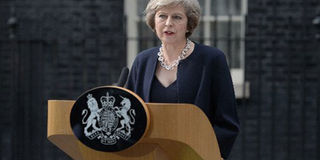Why Africa should be at the heart of UK's Brexit strategy

Britain's Prime Minister Theresa May speaks outside 10 Downing Street in central London on July 13, 2016. PHOTO | AFP
What you need to know:
Judging by the debate over the UK’s future relationship with the European Union and its trading partners, Africa is not even on the Brexit agenda.
The UK is held in high esteem across the continent and Brexit offers a unique opportunity to reset trade relations and create a more equitable model under which British and African companies can collaborate, invest, and trade with each other for mutual benefit.
Of all the issues raised by the UK’s recent Brexit vote, one of those of the most concern is that Africa has been “downgraded”. Judging by the debate over the UK’s future relationship with the European Union and its trading partners, Africa is not even on the Brexit agenda.
Across Whitehall and the civil service, the brightest and best minds are being pulled off other activities and into the Brexit negotiations, depleting the already under-resourced Africa teams. The decision by new Prime Minister Theresa May to fold the Africa Ministry into the Middle East Ministry sends an ominous signal, relegating sub-Saharan Africa to (at best) third place behind the Middle East and North Africa.
Despite creating a brand-new Department for International Trade, the UK is missing a trick. Officials are understandably excited about forging trade deals with the world’s largest economies, from the US and Canada to China and India. But by focusing on the largest economies, it is missing out on a huge opportunity.
Why? Because over the next century, Africa is set to be the world’s fastest-growing region. This growth will be underpinned by economies that are rapidly diversifying and growing their consumer base. Africa already has one fifth of the world’s population and one quarter of its under-18s, and this proportion will rise dramatically over the next 50 years. In tandem, African purchasing power, the rate of urbanisation, and demand for goods and services will also rise. As the UK recalibrates its global trade relationships, Africa needs to be a key partner—not a collection of bitty, disjointed deals based more on luck than design.
The urgency for action cannot be understated, especially as British commercial relations with Africa are surprisingly weak. The UK accounts for just 3.5 per cent of Africa’s total trade, around half the level of France, while FDI flows from the UK into Africa totalled just $2.6 billion in 2014, compared with $18.3 billion from France. Perhaps one of the ironies of Brexit is that the UK now needs to be more French when it comes to its attitude towards Africa.
BACK BURNER
With the prospect that African issues will be put on the back burner as the UK negotiates its exit from the EU, I believe the following three actions need to be taken.
First, the Secretary of State for International Trade needs to create a dedicated Africa team in his ministry, focusing solely on trade and investment with the continent.
Second, we urgently need a strategy for UK-Africa trade. This strategy must not be the usual collection of vague pledges and wishful thinking, but instead one that outlines the areas of trade relations that the UK will address as a priority. The EU’s Economic Partnership Agreements have come under heavy criticism for not truly benefiting African markets, instead undermining local efforts to industrialise while doing little to build African capacity. This gives the UK an opportunity to develop a healthier and fairer trade relationship not based solely on the import of raw commodities and export of consumer goods and services, but which also fosters partnerships between UK and African companies.
For instance, the UK’s fintech sector, with revenues of $6.6 billion last year, has demonstrated how the innovative and business-friendly British model can meld with African ingenuity and deep knowledge of local markets to create huge successes. Mobile money platform M-Pesa is an African poster child for the sector. There is huge scope for other British business sectors to expand into African markets, from engineering to logistics and education.
Third, the UK needs to think bigger than Anglophone Africa. Africa’s four largest Anglophone countries—Nigeria, Ghana, South Africa, and Kenya—are understandably top of the list given their extensive economic and trade relations with the UK. But there is a huge opportunity for British businesses in Francophone Africa, too. Côte d’Ivoire and Senegal are two of Africa’s best performing economies, producing, processing, and exporting commodities to world markets while also acting as hubs for trade and services across the CFA Franc Zone. Francophone businesses would welcome British partners given the relative lack of competition in their markets.
The UK is held in high esteem across the continent and Brexit offers a unique opportunity to reset trade relations and create a more equitable model under which British and African companies can collaborate, invest, and trade with each other for mutual benefit.
Dr Edward George is the head of group research at Ecobank Transnational. This article was first published in 'African Arguments'.




